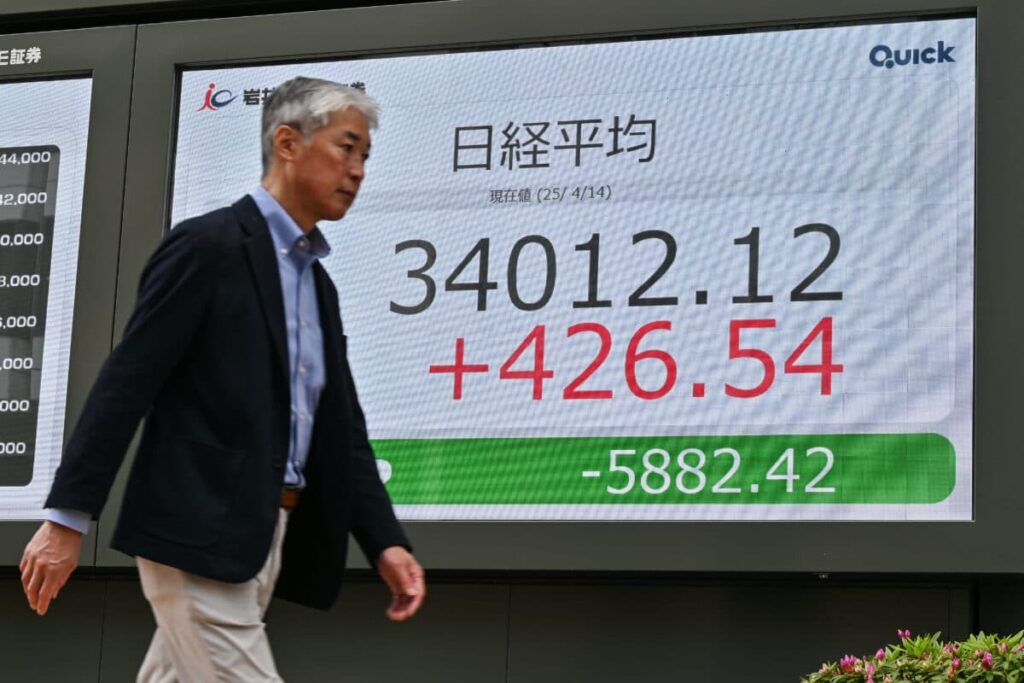
Asian stock markets traded mixed on Tuesday as calm returned after last week’s turbulence, with auto shares rallying on hopes that U.S. President Donald Trump may soften steep tariffs on the sector.
However, investor sentiment remained fragile amid Trump’s unpredictable trade policies. Fresh concerns over potential levies on high-end tech and pharmaceutical products cast a shadow over markets.
A brief boost came last week when the White House announced temporary exemptions on smartphones, laptops, semiconductors, and other Chinese-made electronics — key products in global supply chains. But Trump’s suggestion that the reprieve may be short-lived curbed optimism.
Markets reacted cautiously to U.S. Treasury Secretary Scott Bessent’s remarks on Monday suggesting a China-U.S. trade deal remained possible. “There’s a big deal to be done at some point,” Bessent told Bloomberg TV, while noting decoupling between the two economic giants was not inevitable — but still possible.
Tensions remain high after the U.S. imposed tariffs of up to 145 percent on Chinese imports, prompting Beijing to retaliate with 125 percent duties on U.S. goods.
Adding to the intrigue, Trump adviser Kevin Hassett said the administration had received over 10 offers of “very, very good” trade deals, without offering specifics.
Wall Street’s upbeat session helped lift some Asian bourses. Tokyo and Seoul led gains, buoyed by a surge in automakers after Trump said he was “very flexible” on the auto tariff and was “looking at something to help” manufacturers affected by his 25 percent import duty.
Japanese auto stocks surged, with Toyota and Mazda climbing 5 percent and Nissan up over 3 percent. Hyundai jumped more than 4 percent in Seoul.
South Korea’s pledge to invest an additional $4.9 billion in its semiconductor industry also gave a lift to chip giants Samsung and SK hynix.
Elsewhere in Asia, markets in Sydney, Singapore, Taipei, Manila, and Jakarta edged higher. Hong Kong and Shanghai dipped slightly, while Wellington also ended in the red.
Support came from U.S. Federal Reserve Governor Christopher Waller, who signaled openness to interest rate cuts if the economy weakens — even in the face of elevated inflation.
Waller said that tariffs may trigger a short-term price surge, but added that if economic conditions worsen significantly, he would support aggressive policy easing.
“If the slowdown is significant and even threatens a recession, I would expect to favour cutting the policy rate sooner and to a greater extent than I had previously thought,” Waller said.
However, some warned that policymakers are entering a difficult phase.
“A combination of slowing growth and persistent inflation — classic signs of stagflation — presents a tough dilemma for the Federal Reserve,” said Kelvin Wong, senior market analyst at OANDA.
Key Market Data as of 0230 GMT:
- Tokyo – Nikkei 225: ▲ 0.9% at 34,285.02
- Hong Kong – Hang Seng Index: ▼ 0.2% at 21,379.50
- Shanghai – Composite: ▼ 0.3% at 3,254.04
- Dollar/Yen: ▲ 143.32 from 143.09
- Euro/Dollar: ▼ $1.1327 from $1.1356
- Pound/Dollar: ▼ $1.3179 from $1.3189
- Euro/Pound: ▼ 85.94p from 86.08p
- WTI Crude: ▲ 0.3% at $61.69/barrel
- Brent Crude: ▲ 0.2% at $65.03/barrel
- New York – Dow Jones: ▲ 0.8% at 40,524.79
- London – FTSE 100: ▲ 2.1% at 8,134.34
